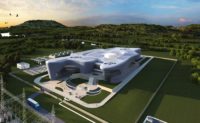Fluor Corp. surprised and pleased market analysts with better-than-expected third-quarter earnings and revenue results revealed earlier this month.
The engineer-contractor reported adjusted earnings of $216 million for the quarter ending Sept. 30, 45% above analysts’ predictions. Quarter revenue of $3.96 billion also exceeded expectations by 3.5%, while backlog stood at $26 million, up 2% year over year.
Fluor raised its 2023 earnings guidance to $600 million from $550-600 million previously. “This quarter’s results reflect our deliberate focus on driving profitability through improved project execution and our high-quality contract backlog,” said CEO David Constable.
Q3 represented the company’s third straight quarter showing 10% growth over the prior year, it said. “We like the odds of positive margin surprise and improved cash flows,” said Andrew Wittmann, senior sector analyst for Baird Equity Research. He said operating income in Fluor’s energy solutions segment surpassed his estimate, “with strong positive cost recoveries on prior jobs more than offsetting a negative claim settlement and continuing problems on a legacy upstream project.” Identities of the projects were not disclosed.
Constable noted “a lot of hard work in clearing out the legacy challenges. We’re getting significantly more comfortable where we are.” He told analysts the firm is using artificial intelligence based on a database of over 200 projects spanning 20 years “to supplement execution across our portfolio” and to provide “predictive pricing on materials for our supply chain.
He noted Fluor's "very structured bid-no-bid process, where we will only move forward if we have the right teams in place." He said the firm has hired 6,500 people over the past few years, with over 30% having worked previously at the firm. "We've had a talent task force in place since early 2022 and that's really working well for us," Constable said.
Fluor “continues to add very high quality backlog at very good rates,” said Constable, noting more investments by mining and industrial clients in energy transition and more front-end studies, including for critical minerals production and green steel technologies. “We’re starting to see clients move forward with final investment decisions,” he said. Constable noted $55 billion of front-end work “ongoing in mining and metals right now.”
Fluor announced Nov. 3 what it termed “a multi-billion dollar” reimbursable award from mining giant BHP for a second stage of its potash mine project in Saskatchewan that could become one of the world’s largest. BHP said investment there is about $4.7 billion.
Small Nuclear Reactor Support
Meanwhile, Constable said talks “with a strategic investor are proceeding well” to monetize Fluor’s 55% stake in small modular nuclear reactor developer NuScale, the only such firm that has US Nuclear Regulatory Commission certification for its SMR design.
That firm announced Nov. 9 that it would cancel its signature test production project, the Carbon Free Power Project with utility group Utah Associated Municipal Power Systems, when too many planned utility member customers opted out of involvement, citing rising power costs. The target $89 per megawatt-hour price announced by NuScale in January for plant power was 53% above a previous estimate of $58 per MWh.
NuScale had planned to develop the six-reactor 462-MW project for a 2030 launch. Set to be the first SMR to win a federal construction license, it also had been awarded in 2020 $1.35-billion In U.S. Energy Dept. funding for ten years.
"In business it is often better not to be first," said Ed Crooks, a sector analyst at energy research firm Wood MacKenzie. "When new technology is being deployed, it is the first mover who takes the greatest risks; the followers have the chance to learn from all the mistakes and unexpected pitfalls that have been revealed." Noting the "bold decision" to launch the SMR project in 2014, its cancelation "was not a complete surprise."
The project's outcome "is a warning sign for the nuclear industry in the US and around the world," said Crooks. "If governments are serious about keeping nuclear power in the toolkit for cutting emissions, developers are going to need more support; particularly for a new first-of-a-kind reactor such as the NuScale SMR."
In a statement, NuScale CEO John Hopkins said the developer "will continue with our other domestic and international customers to bring our American SMR technology to market and grow the U.S. nuclear manufacturing base."
Constable said "NuScale is well positioned to achieve SMR commercialization and is well ahead of any other technology, by five years easily. We're very excited about supporting [it] going forward.”
In a statement, NuScale CEO John Hopkins said the developer "will continue with our other domestic and international customers to bring our American SMR technology to market and grow the U.S. nuclear manufacturing base."
Constable said "NuScale is well positioned to achieve SMR commercialization and is well ahead of any other technology, by five years easily. We're very excited about supporting [it] going forward.”






Post a comment to this article
Report Abusive Comment